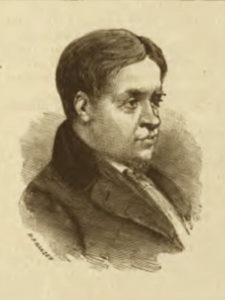On January 26, 1849, Rev. Hjálmar Þorsteinsson, parish priest at the Grenjaðarstaður parish, sought support from President Jón Sigurðsson. The pastor brought up in his discussion the ancient, Icelandic settlement in Greenland, the 1836 Greenland’s poem by Sigurður Breiðfjörð, the Danish “Grönlands historiske Mindesmærker”, and last but not least J. Matthiesen´s 1846 essay on trade in Greenland and colonization of Greenland in which an establishment of a new settlement in the “ancient Eiriksfjord” is strongly recommended.
Rev.Hjálmar Þorsteinsson stated that improved education in Iceland and growing discussion of freedom had awakened the longing of the Nation for better life. Furthermore, he pointed out, ten industrious farmers in his district had formed an association to organize the move to Greenland. The pastor argued that their number would increase without doubt once circumstances improved. This was the help from Jón Sigurdsson he wanted: to request support from Danish authorities in Copenhagen as such a venture was undoubtedly costly.
It should be pointed out that a similar discussion on Icelandic move to Greenland had taken place in the country in the 18th century and at that time over 200 Icelanders had signed up for such a migration to be sponsored by the Danes. The memory of that Greenland adventure, which never took place, may still have lived in some parts of Iceland almost half a century later.
Rev. Hjálmar Þorsteinsson did not have much luck in his efforts but ten years later, that Greenland dream was awakened again due to the disastrous winter of 1858-59. The previous summer had been wet making haymaking extremely difficult and vicious storms hit the northeast as early as September. This was an indication to what the winter would be like, loss of livestock, mostly sheep was unheard of. The desperation throughout the region was such that even much colder Greenland seemed, in the eyes of the north eastern farmers, a feasible alternative. Desperation may be an overstatement as the farmers in question had from 1848 witnessed ten years of growth in farming, the number of sheep per farm had never been as high in the 19th century. A more accurate description may be a general sadness as the farmers watched the gain of a decade vanish before their eyes. Non-stop snowstorms saw countless sheep perish under a thick layer of snow and whatever the farmers managed to rescue and bring home struggled as hay was so scarce. As the farmers watched their animals fade away there was only one thing left to do, slaughter the animals.
In his autobiography Jón Jónsson at Vogar by Lake Myvatn said he had lost 65 sheep that winter, leaving him only with 25. In his county, every farmer had a similar story to tell.
In light of all this, Greenland, perhaps was, after all not such a bad option. The poet, Sigurður Breiðfjörð, had very few good things to say about that country, claiming that hunters in Greenland gain weight in the summer but loose it during the early winter when seaweed was the only edible item available, and later they eat anything, eagles, ravens, dogs, fox, and, worn out clothing and shoes!
Such horrible stories seem to have been ignored by those farmers so interested in Greenland. Perhaps they pictured themselves as the heirs of the Norsemen who settled in Greenland centuries before. The farmers in the North Eastern regions of Iceland ignored the fate of Norse settlers in Greenland which should tempt no one to follow in their footsteps. Yet the Icelanders were considering such a move. Lack of knowledge? Hardly. Unrealistic? Yes, more than likely, and undoubtedly the romantic thought of following into the footsteps of Eric the Red and Leif the Lucky.”The urge of exploration magnified the minds of many, to re-establish the ancient Icelandic settlement in Greenland” stated Bishop Þórhallur Bjarnason later, echoing thoughts of men like Tryggvi Gunnarsson.
The above is based on research of Icelandic Historian Jón Hjaltason and his article ´´Af hverju Grænland´´. English version Thor Group

